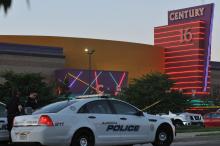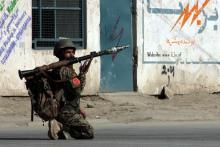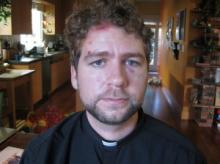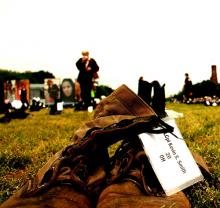Nonviolence

 It's a sad day in Colorado. Our collective hearts hurt.
It's a sad day in Colorado. Our collective hearts hurt.
I didn't want to blog today. Blogging in response to everything that happens in the news can come across as knee-jerk, reactionary, self-serving, and exploitive. We're called to "pray without ceasing" — not to blog without ceasing. Sometimes reverent silence is what is needed.
The staff at Sojourners contacted me and invited me to write something in response to what just happened. So, I'm not writing a blog. I'm providing a Public Service Announcement.

Earlier this week, former President Jimmy Carter critiqued the United States for its (read: our) deteriorating record on human rights and rule of law in the last decade.
But those responding to Carter's New York Times Op-Ed (“A Cruel and Unusual Record”) have largely missed his main point. In the spirit of the Sermon on the Mount, Carter wants to lead America in removing the log from our own eye in hopes of honoring God and regaining our position as champions of human rights and rule of law.
During his visit to Cairo for the Egyptian elections, Carter met with the Grand Imam of Al Azhar — the most authoritative voice in Sunni Islam. Discussing human rights, religion, and the historic election that was taking place outside, Carter exhibited a rare humility in articulating his convictions. I feel that a whole range of human interactions might be improved if we would each remove the log from our own eye before trying to remove the speck from our neighbor’s.
Sitting with women’s rights activists and top Christian leadership; in private briefings and press conferences, this self-critique proved central to Carter’s efforts to build trust and advance human rights in Egypt and around the world.
After decades of lectures from the White House and U.S. State Department, much of the world has grown tired of the West’s wagging finger and “holier than thou” attitude. There may have been an era when this posture had a greater effect, but the U.S. has lost too much of its moral credibility in the wake of Abu Ghraib, Guantanamo, and drone strikes carried out against the President Obama's “Hit List”.

In 1991, Rodney King was stopped and beaten by a group of Los Angeles police officers. The stop was not unusual, and the beating was a tragic reminder of the history and the reality of police brutality in the United States. The difference this time was that the beating was recorded on videotape. Rodney King became a symbol of racist injustice perpetrated by ordinary people, of injustice perpetrated by law enforcement.
Also in 1991, the Norwegian Nobel Committee awarded the Nobel Peace Prize to Aung Sun Suu Kyi, a Burmese activist for democracy. Under house arrest at the time, she could not travel to Oslo to receive the award. She was then and is today a symbol of patient persistent witness against oppression and for human rights.
On June 16, 2012, Aung Sun Suu Kyi received her 1991 prize in Oslo. On June 17, 2012, Rodney King was found dead in the swimming pool of his home. Both of these individuals are important because of their choices for peace.
I was asked recently, is there really any hope for Israel? The answer is yes, there is.
First, the state of Israel has lived its entire existence in the foxhole of the war paradigm. It is time to come out of the foxhole. It is time for Israel to exercise profound concern, not only for its own security and its own peace, but also for the security and peace of its neighbors—the Palestinians.
Second, It is time for Palestinians to recognize Israel’s right to be secure. Israeli mothers should never have to worry if their daughters and sons will return from a walk to the market. Every Israeli should not have to live in extreme fear and the ever present threat of war.
A provocative piece this morning from Akiva Eldar, chief political columnist and an editorial writer for Haaretz. He describes the weakness of the Israeli government when faced with non-violent protest:
“They say the Israel Air Force can carry out a pinpoint strike against Iran's nuclear facilities, yet the Israel Defense Forces loses its cool when confronted by a small group of bicyclists armed solely with cameras. The Shin Bet security service knows how to locate terrorists and assassinate them, but has no clue how to cope with nonviolent civil disobedience.”
After recounting all of the futile efforts at diplomacy and negotiations by the Palestinians in their suits and ties, Eldar advises:
“If Abbas was really so fed up he would replace his tie with a kaffiyeh and lead the masses in a protest march. The Oslo Accords have turned the Palestine Liberation Organization into the mechanism for maintaining the Israeli occupation. It's about time the Oslo generation of Palestinians admits the failure of the diplomatic option, hangs up its suits, weans itself from the pathetic honor it has accorded itself, and takes to the streets.”
I can hear Gandhi and Dr. King cheering.
Each year, the Stockholm International Peace Research Institute (SIPRI) publishes a study on the amount world governments spend on their militaries. The 2011 report was released this week, showing that all countries together spent $1.7 trillion. The Guardian has a helpful country-by-country data page and interactive map. The top 5 in the world last year, totaling $1.05 trillion, were:
U. S. - $711 billion
China - $143 billion
Russia - $72 billion
Britain - $63 billion
France - $62 billion
In contrast, the budget for UN Peacekeeping operations for fiscal year July 2011-30 June 2012 is about $7.84 billion. That’s 0.5 percent of what the world spends on its militaries.
It’s a stark example of the world’s misguided priorities.

On November 21, 1967, General William Westmoreland, U.S. commander in Vietnam, delivered a speech at the National Press Club on war strategy. “We have reached an important point when the end begins to come into view,” he said, and outlined a “new phase” in the war where the U.S. would:
- Help the Vietnamese Armed Forces to continue improving their effectiveness.
- Help the new Vietnamese government to respond to popular aspirations and to reduce and eliminate corruption.
- Help the Vietnamese strengthen their policy forces to enhance law and order.
Then came what is now known as the Tet Offensive. On January 30, 1968, the National Liberation Front launched attacks against cities and towns throughout South Vietnam. It was the beginning of the end, the evidence that U.S. strategy had failed.
Fast forward 45 years. U.S. strategy in Afghanistan emphasizes assisting the Afghan army and police forces to improve their effectiveness along with working to reduce corruption in the government. We hear encouraging speeches from politicians and generals. We’re told the end is in sight.

When I was in my early 20’s, a Bible teacher by the name of Dianne Kannady posed a rhetorical question that continues to haunt me to this day: “If Jesus was your only source of information about what Christianity should look like, how would you live your life?”
That question has gotten me into a lot of trouble over the years.
Consider the three things that instantly come to mind.
1. Jesus preached nonviolence.
2. Jesus was a faith healer.
3. Jesus challenged the religious fundamentalists of his day.

Last week, anonymous U.S. officials told the media that the U.S. military wouldn't stop the drone-launched missile attacks, which they have been carrying out for years within Pakistan.
Discouraging news, indeed. But we all need encouragement, so here's a little good news—images of a chance encounter of a peace-building kind.

Someone beloved to me is suffering from a horrific disease right now. If I could fight this disease with a sword all my pacifist tendencies would run screaming for the hills and I would take up that sword and I would fight. Just the thought raises a rage up within me that is passionately intense and I long for such a sword.
I can’t help but think that Jesus must have felt some of this, human as he was. Because of who he was and what he did the poor and the outcast and the sick were drawn to him and so he saw suffering every day. He healed and he taught and he called for others to follow him, yet the suffering still was all around. Some part of his humanity must have wanted to take up a sword and fight it. Yet he knew that violence was not the answer.
There was another way.
So instead of a sword, he took up... a towel and filled a basin with water.
Gandhi and the Unspeakable: His Final Experiment with Truth, by James W. Douglass.

An umbrella group of Christian denominations committed to combating racism is urging churches to use the death of Florida teen Trayvon Martin as a "teachable moment" to speak out against racial stereotypes.

Amidst the recent police violence in Oakland and the sure temptation of some protestors to resort to violence, I wrote this little reflection inviting all Occupiers to a renewed commitment to nonviolence.
There is a verse in the Bible that says, “Our battle is not against flesh and blood but against the principalities and powers of this dark world.” It is a reminder that there are people behind oppressive structures — people who laugh and cry and bleed just like everyone else — and those people are not the enemies, but the systems are.
I was reminded of this when I went into Bank of America on Move Your Money Day, and transferred my money to the non-profit credit union here in Philadelphia. As I went into the bank, I saw the smiling faces of Bank of America tellers who have become friends over the past decade. When I told them I was closing my account, one of the women asked jokingly, “You don’t like us anymore?” At first my heart sunk, but then I said, “No way, I love the heck out of all of you. I just don’t like the values of the bank you work for.” To my surprise, they all smiled. In fact they may not like the values of the bank they work for either. Even though I’ll be leaving Bank of America, I’m hoping to stay in touch with my friends there. I may even take them some coffees next week, which I’ll charge on my new credit union debit card.
It is always tempting to demonize people and humanize corporations. It’s easy to forget that we are up against something bigger than flesh and blood people. And it’s particularly easy to forget that people are not the enemy when people are shooting pepper spray in your face.

From Sojourners CEO Jim Wallis' eulogy at Scott Kennedy's funeral last weekend:
"Oh Lord, Lord, Lord…. This is a hard one.
You know why we are all gathered here today—Because Scott Kennedy, your good and faithful servant, has always brought us together—to do good things in the world: Necessary things, visionary things, courageous things, and often hard things. But they were things that must have warmed your heart, because they were the things that make for peace.
Jesus told us. ‘Blessed are the peacemakers, for they shall be called the children of God.’ And Scott brought us together, time and time again, to be those peacemakers and thus, really, to be your children—by doing what we were supposed to do.
And now, Scott is with you….and has likely heard you say something like, ‘Well done good and faithful servant.’ But we miss him terribly, and we weren’t ready for this. We just thought we would always have him.
Scott never brought us together for himself; it was never about him, but always about being peacemakers for the sake of other people. But today we gather for Scott. He has brought us together once again, and what a crowd it is—both here and online all around the world. We are all Scott’s peacemakers...."

It does no dishonor to those who served to learn from the mistake that was made in starting an unnecessary war in Iraq. And, to realize that it is a mistake the U.S. continues to make. Andrew Bacevich, a Boston University professor who is also a West Point graduate, Vietnam combat veteran and retired Army colonel; and whose son was an Army officer killed in Iraq put it best. "The final tragedy of a tragic enterprise is that the U.S. has learned next to nothing," he says. "The belief that war works remains strangely intact."

Occupy igloos ... and rooftops. Buy a gun for the one you love ... or a walk-on role on True Blood (for charity!) Theological wisdom from the mouths of (muppet) otters and stand-up comedians. And you never know what you'll find on Google Earth.

Last year in a blog post, I suggested that believers pray for the world’s bad actors, among them, the Burmese generals and Zimbabwe’s Robert Mugabe.
Someone must have prayed.
Secretary of State Hillary Clinton is in Burma, the first time in many years that a high-ranking American official has visited that country. President Obama has decided to send her to assess the situation after seeing signs of hope that the human rights situation is getting better.
In May 2009, Nobel Peace Prize Laureate Aung San Suu Kyi was under house arrest. Today, she has been released and the pro-democracy party that she represents has registered with the government. It plans to participate in upcoming elections.
Time Magazine reports that Burma’s new rulers are easing restrictions on media coverage. It has not, however released the large numbers of political prisoners it is holding, and it even fails to acknowledge that it is holding political prisoners.
For the uninitiated, "Alice's Restaurant Massacree" (that's its official name) is a folk classic, an epic musical monologue from Arlo's 1967 album also called "Alice's Restaurant." it tell the mostly-true story of Thanksgiving Day, Nov. 25 1965 in Stockbridge, Mass., when then-18-year-old Guthrie and his friend Richard Robbins, 19, were arrested by police officer William "Obie" Obanhein for illegally dumping garbage at the town dump that was closed for the holiday. Two days later, they pled guilty in court before a blind judge.